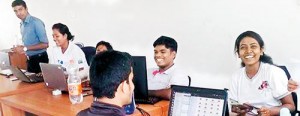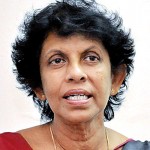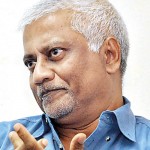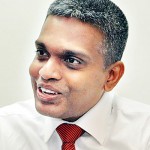Open data culture needed in Sri Lanka – ICT policy expert

File Photo: Young entrepreneurs at the newly opened Lankan Angel Network (LAN) Incubation Centre, in Colombo 4, hard at work trying to get their start-ups to the next phase, when they will hopefully be able to afford their own office space and other perks like higher salaries.
Sri Lanka should facilitate an open data culture, which will, amongst other things, foster products being built out of the public ‘Big Data’ resources currently restricted by the government, according to Prof. Rohan Samarajiva.
The Founder/Chief Executive of Sri Lanka-based ICT policy and regulation thinktank LIRNEasia, Prof. Samarajiva also comsmented that additional problem areas that were a priority for Sri Lanka were slow broadband speeds, too-high latency times, slow international web accessibility, too much monopoly-type power vested with state-run Sri lanka Telecom in terms of pulling cable, etc and putting proper payment systems in place (including PayPal).
He also noted that one way the Sri Lankan government can truly help local innovators was by allocating pilot programmes for technologies they created.
He pointed to the example of MillenniumIT, which may never have got off the ground without the initial assistance and continued support from the Colombo Stock Exchange, despite several early teething issues. He also indicated that a country the size of Sri Lanka had the nimbleness and size requisite for pilot projects to do well.

Ms.Chitranganie Mubarak
Prof. Samarajiva made these remarks at a Business Times panel discussion on ICT innovation and awareness held on Wednesday at the newspaper office auditorium, where he was joined by ICT Agency Chairperson Chitranganie Mubarak and SLASSCOM Board Member Indaka Raigama.
Meanwhile, Ms. Mubarak stated that ICTA’s vision was to bring technology to every citizen in every village, via ICT-based initiatives around areas like education, health, disabilities, etc. However, she noted that there was a very important, human element to all of these that cannot be done away with.

Prof. Rohan Samarajiva
As an example, she highlighted a recent programme providing medical consultations to rural people via Nenasala telecentres that did not draw much interest.
She opined that, “while it works well on paper, a person might really prefer face to face interactions (with doctors). I feel this is the case in countries like ours where it is relatively easy to access a medical specialist, compared to India and Bangladesh where long distances and difficult terrain may restrict ease of access”.
Similarly, stated Ms. Mubarak, there was an ICTA project at Kurunegala Hospital, where a high incidence of Thalassemia was reported. This worked to a certain extent because the initial consultation occurred at a hospital.
But it was not a huge success.
Ms. Mubarak, however said there was potential in other areas of e-Health in Sri Lanka, other than remote consulting, such as radiology.

Indaka Raigama
There are only a few radiologists island-wide and a facility was recently put in placa where small hospitals could send x-rays, etc to large hospitals to get these checked out and reported on by radiologists on staff. Also, ICT has a big role to play in gathering and tracking epidemics through the collection of public health data. E.g. showing how dengue is currently spreading.
At the same time, Mr. Raigama signalled that one area that needed improvement locally was technology literacy for older generations of people. Literacy was relatively low in older populations compared to similar groups in western countries. This is because there needs to be a cultural change to facilitate more rapid adoption.
He also noted that, in Sri Lanka, technology was supplied for mainly profit-making businesses and entertainment but, in more mature countries, a need was seen to facilitate NGOs like think-tanks to aid in social issues.
As such, what was missing at the moment was collaboration amongst many different groups and multiple sectors, both public and private, to take the country forward.
In addition, Mr. Raigama also highlighted, to drive innovation through technology, the biggest hurdle that Sri Lanka currently faced was that innovators need a lot of support, and many students/workers with an idea were not well off enough that they could forgo consistent work in favour of entrepreneurship and start-up opportunities with uncertain pay-offs.
Also commenting, audience member and well-known medical scientist Prof. Vajira Dissanayake revealed that a simple intervention by a few local medical students interested in getting more up-to-date health statistics had led to their report becoming the de-facto standard for health statistics in Sri Lanka, accessing data from about 250 local large and small hospitals.
This project had also resulted in US$ 200 million over five years in World Bank allocations to study and deploy similar projects elsewhere.
He also noted that, despite the country’s much-touted health gains, 40 per cent of local children are malnourished, so a pilot study was underway where midwives from three districts were given smartphones and trained to enter real-time data to find out where public health service interventions could best occur.


